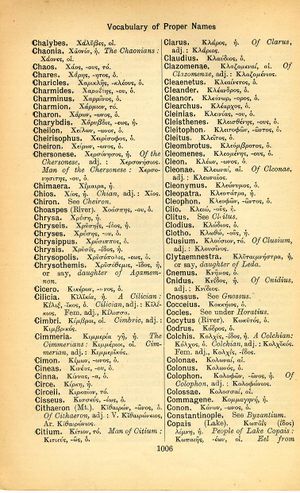Clio: Difference between revisions
From LSJ
m (Text replacement - "}}]]" to "}}]]") |
m (Text replacement - "link={{" to "link={{") |
||
| Line 1: | Line 1: | ||
{{WoodhouseENELnames | {{WoodhouseENELnames | ||
|Text=[[File:woodhouse_1006.jpg|thumb | |Text=[[File:woodhouse_1006.jpg|thumb | ||
|link= | |link={{filepath:woodhouse_1006.jpg}}]][[Κλειώ]], -οῦς, ἡ. | ||
}} | }} | ||
{{Lewis | {{Lewis | ||
Revision as of 10:10, 15 August 2017
English > Greek (Woodhouse)
Κλειώ, -οῦς, ἡ.
Latin > English (Lewis & Short)
Clīo: ūs, f., = Κλειώ.
I The Muse of history: Clio Cliusque sorores, Ov. A. A. 1, 27; Hor. C. 1, 12, 2.—
II A daughter of Oceanus, Verg. G. 4, 341.
Latin > French (Gaffiot 2016)
Clīō,¹³ ūs, f. (Κλειώ), muse de l’Histoire : Hor. O. 1, 12, 2 || une néréïde : Virg. G. 4, 341.
Latin > German (Georges)
Clīō, ūs, f. (Κλειώ), I) die Muse der Geschichte, Hor. carm. 1, 12, 2. Ov. art. am. 1, 27: neben den übrigen Musen, Anthol. Lat. 88, 1 (616, 1): appellat. = die »Muse« übh., Iuven. 7, 7. – II) eine Nymphe, Tochter des Oceanus, Verg. georg. 4, 341.

